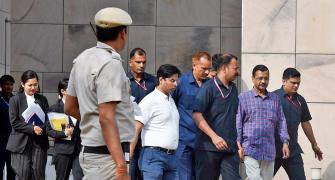Six days after the West Bengal police sought to re-establish control in the Nandigram area, 140 km south-west of Kolkata, on March 14, Nirupam Sen, the state's commerce and industry minister, spoke to Ishita Ayan Dutt and Tamajit Pain about how the state government and the Left Front intend to repair the damage caused by that day's events.
Sen is one of the most senior members in the CPI (M) state hierarchy, comes from the farming belt of Bardhaman, north-west of Kolkata, and is widely regarded as a "pro-changer" in the government. This is his first interview to the media after the Nandigram crisis, which caused the deaths of many local people. Excerpts:
What impact will the Nandigram incident have on industrialisation in the state?
Industrialisation is a continuous process. The process has slowed a bit after the incident, but we are trying to speak to the investors and convey the real situation to them. Investments have already been taking place in the state.
Four steel companies are setting up plants in the state. IISCO is going in for a major modernisation. The construction equipment unit of Telcon (to manufacture heavy equipment) and a biotech park have been planned near Kharagpur (west of Kolkata).
In Howrah, the government is helping industry set up parks for foundry units, rubber products and foods sectors. The chemical hub was proposed as part of the Centre's initiative to specify a petroleum, chemical, petrochemical investment region and the state evinced its interest in having the project near Haldia.
So how does the government plan to regain investor confidence?
We will fight a two-way battle. On the political side, we will expose the political gains that vested interests are deriving from this crisis. So we have to talk to the people and explain the benefits of industrialisation.
On the administrative front, we will look at a comprehensive rehabilitation package for the people who are impacted in all the projects. We will tell investors that every project must have a rehabilitation package.
We have done that in the Tata Motors (for its small-car project north of Kolkata) project as well. The state will go beyond compensating people. They will be rehabilitated.
But investors must be worried...
We are in constant touch with investors. They understand. And it's not something unique to West Bengal. It's happening everywhere, but unfortunately only West Bengal is so talked about. People don't talk about Kalinga Nagar.
But how can the government achieve industrialisation against the will of the people?
The perception is wrong. The people and, more so the youth, support industrialisation. It is a necessity. If you consider the population density, you will realise that the success in agriculture cannot be sustained. We need to take the pressure off agriculture and land is required for industrialisation.
The entire situation is politically motivated. The land-owners were misled for political gains. Not a single opposition party is saying it is against industrialisation and this reinforces our belief that people are not against industrialisation as a concept. But industry cannot happen in the air. The opposition is just trying to destroy the congenial atmosphere we created for industry.
How much land would be required for industrialisation over the next five years?
We have proposals worth Rs 1,00,000 crore (Rs 1000 billion) over the next five years, which would require 1,00,000 acres. The total agricultural land area in Bengal covers 1.35 crore acres. We have only 23,000 acres vested with us, which is largely scattered across 18 districts. In fact, some land parcels are as small as one acre.
The perception is that the land acquisition process adopted by the government was faulty. What is your step going forward? Will you let the companies negotiate directly with the land owners?
In the case of small projects, we are asking companies to negotiate with the land owners directly. But for large tracts of land like the Tatas' Singur project, the government has to intervene since there were 13,000 landowners in the 1,000-acre plot and it's not possible for the company to convince everyone to sell.
In the case of the foundry park, we asked the foundry association to acquire land on its own, but it faced problems. Land speculators had acquired about 80 acres of land in patches out of the total 300 acres. We stepped in because the government's primary role is to act as a facilitator.
We are facing problems while acquiring land for a bypass through Bongaon to reach the Petropole border trade post with Bangaldesh. The government also needs land for the link roads to Assam via Siliguri and Kolkata and the proposed East-West Corridor.
Why did you choose Nandigram for Salim's special economic zone project?
The chemical hub project requires proximity to a port since the raw materials had be imported through a pipeline. That is why the government chose the region near the Haldia port. It was a comprehensive project and we wanted to transform a backward area like Nandigram. It would have changed the economic pattern of Nandigram.
Now that the SEZ plan is off at Nandigram, what other locations is the government looking at?
The project will have to be around Haldia.
Will the government shelve land acquisition closer to Kolkata?
No, that's not possible. We can't ask Infosys or Wipro to go to Purulia or Bankura (districts in western West Bengal). Location depends on the nature of the project. For instance, the steel companies don't want to be close to Kolkata, which is diametrically opposite to what the IT and ITeS companies want.
What will you do with the disputed 330 acres in Singur, which the opposition claims was acquired without landowners' consent?
There is no issue here. Even if it is taken into account, we should consider that we are a democracy, so why are we supporting the minority? If we take this allegation at face value then we have consent for the majority of the land.
How will the government rehabilitate people?
For the Singur automobile project, we have ensured that training is being imparted to the people. Self-help groups are being formed to ensure alternative employment opportunities for the displaced people. Tata Motors has been asked to collaborate with five ITIs in the state to ensure right training and employability. Catering training is being imparted to women.
In the foundry park at Howrah, a training institute has been planned. Our government is very concerned about the economic rehabilitation of the marginal farmers who are losing land in the process.






